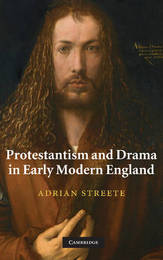
|
Protestantism and Drama in Early Modern England
Hardback
Main Details
Description
Containing detailed readings of plays by Shakespeare, Marlowe and Middleton, as well as poetry and prose, this book provides a major historical and critical reassessment of the relationship between early modern Protestantism and drama. Examining the complex and painful shift from late medieval religious culture to a society dominated by the ideas of the Reformers, Adrian Streete presents a fresh understanding of Reformed theology and the representation of early modern subjectivity. Through close analysis of major thinkers such as Augustine, William of Ockham, Erasmus, Luther and Calvin, the book argues for the profoundly Christological focus of Reformed theology and explores how this manifests itself in early modern drama. Moving beyond questions of authorial 'belief', Streete assesses Elizabethan and Jacobean drama's engagement with the challenges of the Reformation.
Author Biography
Adrian Streete is Lecturer in English at The Queen's University of Belfast.
Reviews'... provides an innovative, articulate account of the metamorphosis of the figure of Christ. ... Recommended.' Choice Reviews Online 'One of the most thought-provoking and innovative books of the year ...' Studies in English Literature 'Streete's methodology ... is remarkably fruitful and compelling. ... Protestantism and Drama offers a more complete and nuanced picture of the early modern subject than has been offered before.' Renaissance Quarterly
|